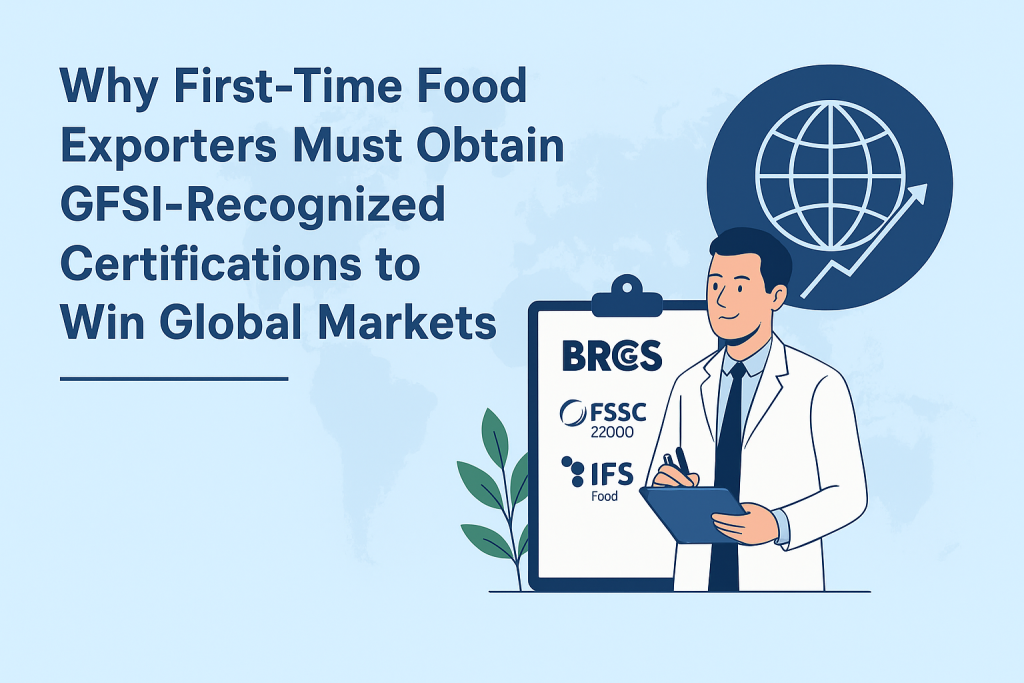
Entering the global food market is exciting—but also highly competitive. For first-time exporters, standing out isn’t only about taste, packaging, or price. It’s about trust. International buyers, retailers, and distributors look for verified assurance that your food products are safe, consistent, and compliant with recognized standards.
That’s where GFSI-recognized certifications such as BRCGS, FSSC 22000, and IFS Food come in. These globally accepted standards act as your passport to credibility, proving that your food safety management system meets the expectations of major global markets.
What is GFSI and Why Does It Matter?
The Global Food Safety Initiative (GFSI) is an international organization that benchmarks and recognizes food safety standards accepted worldwide. Instead of creating its own standard, GFSI approves several leading schemes that meet strict criteria for food safety management.
Recognized GFSI schemes include:
✅ BRCGS (Brand Reputation through Compliance Global Standards)
✅ FSSC 22000 (Food Safety System Certification 22000)
✅ IFS Food (International Featured Standards)
✅ SQF (Safe Quality Food)
Holding any of these certifications signals to global buyers that your business follows world-class food safety practices—from sourcing and processing to packaging and distribution.
Why GFSI Certification is Essential for First-Time Exporters
If you’re new to the export industry, you might wonder why these certifications are so critical. Here’s why:
-
🔒 Builds Trust and Credibility
Global buyers often work only with certified suppliers. Having a GFSI-recognized certification tells them your company values safety and quality as much as they do. -
🌍 Meets International Market Requirements
Many countries and retailers (especially in Europe, the UK, and North America) require suppliers to hold GFSI-recognized certifications before approving shipments. -
💼 Increases Export Opportunities
Once certified, your business automatically qualifies for more partnerships, tenders, and long-term contracts with reputed global brands. -
⚙️ Improves Internal Efficiency and Food Safety Culture
Certification doesn’t just improve documentation—it enhances operational consistency, traceability, and employee awareness. -
💰 Reduces Risk of Rejection or Recall
Meeting recognized standards minimizes contamination, recall incidents, and costly rejections at ports or by clients.
Choosing the Right Certification: BRCGS, FSSC 22000 or IFS Food
Each GFSI-recognized standard has its strengths depending on your product type and target market:
-
BRCGS – Widely accepted by UK and European retailers. Best for ready-to-eat and processed food manufacturers.
-
FSSC 22000 – ISO-based and ideal for companies exporting to multiple markets with a flexible system structure.
-
IFS Food – Popular across Europe and perfect for companies supplying private-label products or retail chains.
A professional consultancy can help you identify which certification aligns best with your export goals and client expectations.
How SAFO Consultancy Can Help
At SAFO Consultancy Pvt Ltd, we specialize in helping first-time food exporters achieve GFSI-recognized certifications. Our services include:
🔹 Gap analysis and system development
🔹 Staff training and internal audits
🔹 Documentation and implementation guidance
🔹 Coordination with accredited certification bodies
We simplify the process—helping you go from local supplier to trusted global exporter with confidence.
📞 Hotline: +94 77 3611640
📧 Email: info@safoconsultancy.com
🌐 Website: www.safoconsultancy.com
Conclusion: Build Trust Before You Export
In global trade, trust comes before transaction.
Obtaining a GFSI-recognized certification like BRCGS, FSSC 22000, or IFS Food proves that your business is export-ready and committed to delivering safe, high-quality food products worldwide.
Whether you’re a small manufacturer or a growing exporter, partnering with the right consultancy ensures your certification journey is smooth, strategic, and successful.
Start your export journey with confidence — start with food safety.
